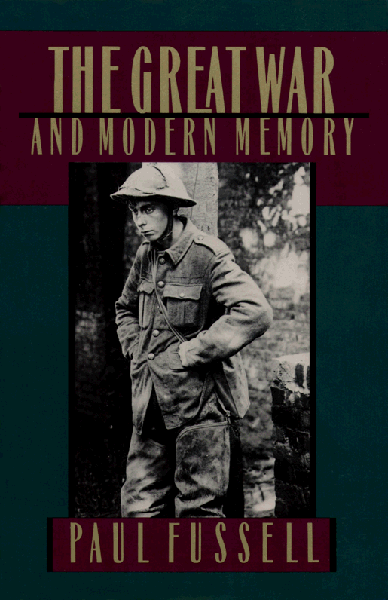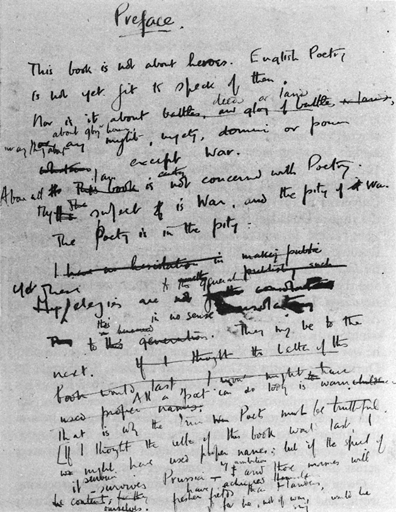 |
"Out of the world of summer, 1914, marched a unique
generation." |
Paul Fussell (b. 1924) |
Critical Works
.jpg) Some
soldier poets / by T. Sturge Moore. -- London : G. Richards ltd., 1919. Some
soldier poets / by T. Sturge Moore. -- London : G. Richards ltd., 1919.
A very early (1919), and therefore quite prescient survey of Great War
poetry by Thomas Sturge Moore (1870-1944). The poets Moore highlights include:
Julian Grenfell, Rupert
Brooke, Robert Nichols, Siegfried Sassoon, Robert
Graves, Charles Sorley, Edward Thomas, Richard
Aldington -- all destined to have their names on the memorial stone
at Westminster Abbey
-- and American Alan Seeger.
.jpg) English
Poetry of the First World War ; a Study in the Evolution of Lyric and Narrative
Form / by John H. Johnston. -- Princeton, N.J., Princeton University
Press, 1964. English
Poetry of the First World War ; a Study in the Evolution of Lyric and Narrative
Form / by John H. Johnston. -- Princeton, N.J., Princeton University
Press, 1964.
The first full-length study of Great War poetry, and an early champion
of David Jones' epic In Parenthesis. Johnston's thesis
of the evolution of lyric and narrative forms traces the lyrical poetry
of "early" war poets such as Rupert
Brooke, Julian Grenfell,
and others; the poetic experiments of Siegfried
Sassoon and Wilfred Owen; the
"thematic cycles" of Robert
Nichols; the narrative poetry of Herbert
Read; and finally David
Jones' epic prose-poem In Parenthesis.
.gif) Heroes' Twilight; a Study of the Literature
of the Great War / by Bernard Bergonzi. -- <1st American ed.>
-- New York, Coward-McCann <1966, c1965> Heroes' Twilight; a Study of the Literature
of the Great War / by Bernard Bergonzi. -- <1st American ed.>
-- New York, Coward-McCann <1966, c1965>
An excellent survey of Great War poetry, fiction, and memoirs. Bergonzi
methodically outlines the works of the major poets (grouped together by
style/time period), authors of fiction, and memoirists (and even "civilian
responses") while including historical and biographical background
for context.
.jpg) Promise
of Greatness : the War of 1914-1918 / Edited by George A. Panichas ;
Foreward by Sir Herbert Read. -- London : Cassell & Company, LTD., 1968. Promise
of Greatness : the War of 1914-1918 / Edited by George A. Panichas ;
Foreward by Sir Herbert Read. -- London : Cassell & Company, LTD., 1968.
A collection of essays on the war by such writers as Robert
Graves, Edmund Blunden, Sir Basil Liddell Hart, R.
C. Sherriff, R.
H. Mottram, Vera
Brittain, and with a foreward by Herbert
Read.
 The
Great War and Modern Memory / Paul Fussell. -- New York : Oxford University
Press, 1975. The
Great War and Modern Memory / Paul Fussell. -- New York : Oxford University
Press, 1975.
A landmark book, still "the classic modern interpretation"
(Judd 15). Fussell surveys Great
War poetry, drama, fiction, memoirs, and even letters and general culture,
finding in them earlier influences, and also tracing their influence on
subsequent twentieth-century writing, culture, and thought. This is the
book with which all subsequent critics have had to deal -- a knowledge of
it is essential to the study of Great War literature.
.jpg) Rites
of Spring: The Great War and the Birth of the Modern Age / Modris Ecksteins.
-- London : Black Swan, 1990. Rites
of Spring: The Great War and the Birth of the Modern Age / Modris Ecksteins.
-- London : Black Swan, 1990.
Ecksteins takes readers on the fascinating journey of "Modernism"
beginning with Stravinsky's The Rite of Spring, through the Great
War and post-war, eventually to Hitler's suicide in the Spring of 1945.
 The Price of Pity : Poetry, History and Myth in
the Great War / by Martin Stephen. -- 1st ed. -- London : Leo Cooper,
1996. The Price of Pity : Poetry, History and Myth in
the Great War / by Martin Stephen. -- 1st ed. -- London : Leo Cooper,
1996.
An excellent, perceptive critical study of Great War poetry by the editor
of Never Such Innocence:
a New Anthology of Great War Verse.
BYU Theses
- Not Unusual Young Men : Similarities in Diverse British Poets
of the First World War / by Robert S. Means. -- 1994.
Department of English, M.A. Degree, April 1994. Abstract: An
explanation of the historical and literary background of World War I is
necessary to demonstrate how and why the poetry of the war was written
in the style that it was. Because of the social and literary conventions
of the time, much patriotic verse was written throughout the war, and not
(as is commonly believed) just at the start of the war by such poets as
Rupert Brooke. Other major war
poets (Siegfried Sassoon, Wilfred
Owen, Robert Graves, and Isaac Rosenberg, for example)
wrote patriotic verse, and many of them were actually influenced by Brooke's
patriotic "War
Sonnets," and were associated with him in the romantic Georgian School of poetry. A comparison
between Sassoon and Brooke, in particular, demonstrates the similarities
shared by the two poets, and suggests that, had he lived and experienced
combat, Brooke's pre-war poetic style might have evolved as Sassoon's early
poems did into a more realistic poetry. A new look at Brooke is needed
to separate him from the myth laid on him by politicians and biographers.
Within a social and historical context, Brooke's poetry can be appreciated
as fitting the early days of the war. Because the cultural and historical
aspects of the First World War are germane to the poetry of the war, a
historical criticism is needed to fairly judge World War I poetry and poets.
- Poetry Is In the Pity : Wilfred Owen / by Sami Kirreh. --
1986.
Department of English, M.A. Degree, December 1986. Abstract: The
meaning of the term "pity" as Wilfred
Owen, an English poet who wrote during the First World War, uses it
in his Preface, remains a perplexity to the minds of many critics. This
study attempts to define "pity" specifically and closely in relevance
to Owen' poems, and put it in a universal context that involves mankind
in general.
- Visceral Imagery in the Poetry of World War I Soldier Poets
/ by Trenton L. Hickman. -- 1994.
- Wilfred Owen and Truth / by Hanadi I. Soudah. -- 1988.
- Department of English, M.A. Degree, April 1988. Abstract: Wilfred Owen's life and poems have
been stu
died extensively. but few critics have dealt with Owen's concept of truth,
and then only briefly. This study attempts to define Owen's view of the
truth about the trenches, describe his dedication to showing the horrors
of war, put him into a period context, and show through a close study of
some of his war poems his determination to reveal the truth he had gained
by experience.
|